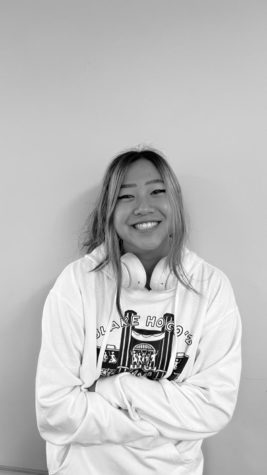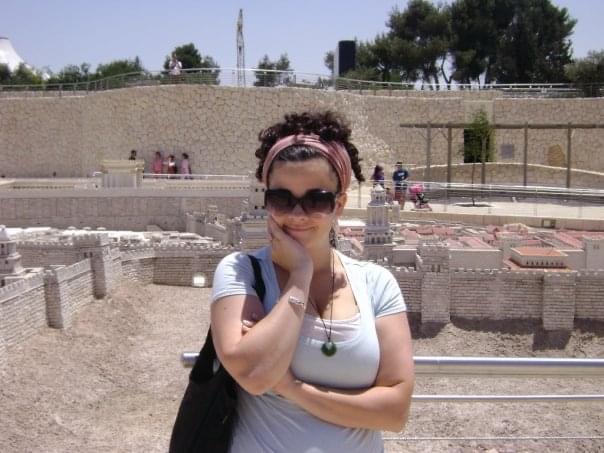Ms. Mac: A Journey of Exploration
Mackenzie McIlmail shares family background, heritage
Submitted by: Mackenzie McIlmail
McIlmail traveled to The Israel Museum in Jerusalem, Israel. She elaborates, “I am standing in front of a miniature version of Second Temple Jerusalem. I travelled to Israel as part of an educational trip and then had the opportunity to meet some of my husband’s extended family.”
Currently, Mackenzie McIlmail teaches Gender Studies, AP European History, and AP U.S. History. McIlmail’s mother’s side of the family is from Sicily and Portugal. One line on her mother’s side goes back about 500 years in the United States, primarily around Rhode Island. Her father’s side of the family has roots from Northern Ireland and Scotland. She also identifies as Jewish, which is also another important aspect of her identity.
McIlmail comes from an Irish family in which women did not graduate high school, but men were allowed to. Her grandmother had to quit school after tenth grade. McIlmail remarks, “ironically, now my job is teaching tenth graders. I think about that a lot, that I am doing what my grandmother and my mother could not have imagined at my age.”
Growing up in a military family, McIlmail moved very often, primarily around the United States. She has been to almost every single state and attended many different schools. When asked to elaborate on her experience as being part of a military family, McIlmail reflected, “[g]rowing up in a military family gives a perspective about the real world ramifications of political decisions politicians make. I think students sit and read a history text about a war and the people who serve in those conflicts are faceless and nameless. And these people have families that pay a real price for that. When I read about historical events, it is easier for them to come to life. I exist in a world in which historical events have shaped my life. The First Gulf War, the Iraq War, and 9/11 have profoundly shaped who I am as a person.”
McIlmail also observed that growing up in different places introduced her to a variety of perspectives and life skills. “Growing up in a military family makes you flexible; I feel more comfortable meeting new people and I feel comfortable having to figure out my way in a foreign country. One of the nice things to say about the U.S. military is that it is incredibly diverse. I grew up in areas in which I was not the prominent identity. I was lucky that I got to meet people from around the world and get diverse perspectives at a very young age. It helped me recognize my own privilege and at the same time be empathetic to people who don’t have the same privilege.”
These experiences did not stop after McIlmail’s childhood. Before McIlmail came to Blake, she lived in Greensboro, North Carolina, where she taught at an international boarding school. McIlmail recalls that initially, “I was very skeptical. I had moved from Brooklyn, New York, to this sleepy town. Only thing I knew were the civil rights sit-ins.” However, she “found a city that had multiple HBCUs, historical black colleges and universities. I found a city that had a thriving Jewish population with three synagogues. It had the friendliest, most down to earth, outgoing people and it was more progressive than I thought it was going to be.” Additionally, McIlmail added that living in Brooklyn “had a huge impact as well” with its energy, diversity, and culture.
Parts of McIlmails’ heritage have influenced her travels. Specifically, she mentioned her trip to Scotland, explaining, “When I went to Scotland a few years ago, the idea was to visit family and do some sightseeing. I had done an extensive amount of genealogical research going back to 1700 in Ireland.” As a result of her research, McIlmail was able to trace her family from Ireland to Scotland. She explained, “[a] lot of Irish people didn’t have tangible skills, so they would move to Scotland to work on textile mills. I had the street address where my family lived in Scotland, the address of a factory. I had death records, birth records, marriage records.” During her trip, McIlmail took a train from Glasgow to a small town her great grandfather had emigrated from and was the first McIlmail to go back.
McIlmail also brought up her trip to Israel, where she met her husband’s Israeli family. Her studies of Israel influenced the way she took in everything around her. She noted that “[a]s a historian, it was difficult to walk through the country and not constantly have this microfiche run through my head of all the histories that I knew. I’m seeing architecture and thinking about what time periods and I’m seeing food and thinking about the influences of other countries.” McIlmail pointed out that what stuck out to her was how long the history is. “It’s not even year zero, it’s millenia upon millenia, which we really only have some knowledge of. I think it expanded my worldview in terms of how complicated history is.”
Aside from living in a military family and studying history, McIlmail’s identity itself shapes her worldview: “As a Jewish woman I tend to see the living impact of history. It feels ever-present in Jewish rituals, holidays, and memories. It still has very real ramifications for the way I interact with the world and the way I interact with my students. That can be a positive or a negative. There’s a famous quote from James Joyce, ‘History is a nightmare from which I am trying to awake,’ where you are just being haunted by it.” Her Jewish identity and to a certain extent her Irish identity has such an emphasis on social justice and learning from history, which is what motivated her to pursue teaching.

Hi I'm Julia! I am a senior and this year I am the business manager for Spectrum. I joined Spectrum my junior year and I've also occasionally contributed graphics...






